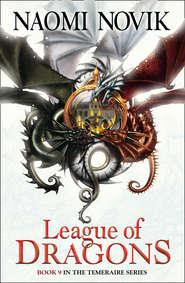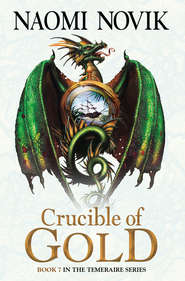По всем вопросам обращайтесь на: info@litportal.ru
(©) 2003-2024.
✖
Blood of Tyrants
Автор
Год написания книги
2019
Настройки чтения
Размер шрифта
Высота строк
Поля
No-one had said a word to him, all that time—no-one had mentioned that Laurence was nowhere to be seen, and likely carried overboard with the chains—until he had finally been able to land exhausted on the deck, and look about, and Roland had slowly come and told him softly that Laurence was lost.
Temeraire did not mind admitting that it had been a very dreadful moment, and he had indulged himself in imagining consequences as dire as any of them. He had gone and swept frantically over all the neighboring ocean, every moment a torment as he found not the least sign of the tarpaulins or Laurence anywhere. But he had forced himself to stop searching empty waves—it had already been several hours, and Laurence would certainly not have stayed in the water, but would have struck right out for land, sensibly—and had gone back to the ship to consult maps to determine where best to find Laurence, and organize a better rescue.
It had not occurred to him that anyone would be so ridiculous as to throw some business of politics in his way: this nonsense of Japan being closed to foreign shipping, and unreasonably intolerant of visitors. Of course Hammond might be counted on to try offering him objections on such flimsy grounds, but Temeraire would have thought better of Granby and Captain Harcourt to lend themselves to it, or any of the other dragons’ captains.
Temeraire was trying to be just: he did not hold it against anyone, much, that they had not noticed Laurence missing in the great confusion—although he had been trying to save the entire ship, and others had not been in quite so crucial a position; someone else might have looked sooner—“But I do not think it unreasonably selfish of me,” he said, “that now the others should keep on without me, until I have found Laurence. And I will certainly go at once.”
The storm was gone and the winds had died down, and Maximus and Kulingile could take it in turn to keep the ship from being smashed upon the shoals: Kulingile was aloft even now, doing his turn alone, and the ship was perfectly well. It did not signify if a few waves came over the side; sailors had to be prepared to get a little wet, now and again.
“I do not even mean to be gone very long,” Temeraire said. “I am only asking to take perhaps twenty men, or thirty, and fly to the nearest shore and begin a search: certainly we will find him very soon. Particularly if we should make inquiries amongst the populace.”
“We must do nothing of the sort,” Hammond said, leaning over the rail and mopping his brow with his handkerchief: the weather was pleasantly hot now under the direct sun, which they had not seen for several days. “Nagasaki is the only harbor of Japan even open to any Western trade: the law utterly forbids the entry of any foreigners into the country, and if they should find Captain Laurence thrown up on their shore—” He stopped talking with a choking cough, as Granby stumbled with the swell on the shuddering deck, and knocked him in the side.
“If they do not want any foreigners about, they should be all the happier for us to find Laurence, and depart,” Temeraire said, feeling himself on eminently solid ground. “And after all, we can tell them we do not want to be here, either: we are only on our way to China, and if we had not run into that dreadful squall we should not have troubled them in the least.”
“Perhaps instead you might proceed at once to Nagasaki,” Gong Su said; he did not quail when Temeraire turned a cold glittering eye upon him, although he did add, “I beg your forgiveness for speaking of a course of action which is distasteful to you, but no good can come from failing to follow the proper forms of intercourse. I am sure that an inquiry laid with the harbormaster, with the proper respect, is most likely to yield the fruit which we all desire: the prince’s safe return.”
“Not much chance of that, certain sure,” O’Dea muttered, from where he was sitting not far away, wrapped in an oilskin and huddled up to Iskierka’s side for the warmth, pretending to be worming a rope usefully when really he was only listening. “Cruel, I call it, to keep up his hopes: the ocean keeps what she takes.”
“Thank you, O’Dea, that is enough,” Granby said sharply.
“It is enough,” Temeraire said. “You need not silence him, when he is only saying what you all think. Well, I do not care. I am not going to Nagasaki; I am not going to China; I am not going anywhere without Laurence, and I am certainly not going to only sit here and wait.”
“No, of course you aren’t,” Granby said under his breath.
“Oh, yes, you are!” said Iskierka cracking open an eye, now of all times. She had slept nearly the entire storm away fastened down in the most comfortable place, between Maximus and Kulingile, with Temeraire curled round and Lily, Messoria, and Immortalis all heaped on top; during the crisis, she had done absolutely nothing but huddle on an exposed rock and watch, grumblingly, while the rest of them had worked. And now the ship was more secure, she had slung herself, very inconveniently for everyone else, around the base of the mizzenmast to keep sleeping all the day.
“I am not, in the least!” Temeraire said to her, with strong indignation: if she were to tell him Laurence was dead, he would clout her across the nose. “Laurence is not dead.”
“I don’t see why he should be dead,” Iskierka said, “what has that to do with anything? But you are not going haring off into the countryside when we are stuck here on these rocks, and anything at all might happen to the ship.”
Temeraire thought this ridiculous. The storm was over, and the Potentate had not sunk yet; she would not sink now. “Whyever ought I stay here, when Laurence is lost somewhere in Japan?”
“Because I am going to have the egg tomorrow,” Iskierka said, then paused and tilted her head thoughtfully, “or perhaps to-day: I want something to eat, and then we shall see.”
“The egg?” Granby said, staring at her. “What egg? What—do you mean to tell me the two of you blighted fiends have been—”
“Well, of course,” Iskierka said. “How else could we have made an egg? Although,” she added to Temeraire, “it has been a great deal more trouble for me, so once it is out, I think it is only fair you should look after it: anyway you are not going anywhere, until it is quite safe.”
Chapter 2 (#ulink_8359b033-596c-5fab-ad3a-85b650a7a86c)
Another full day passed in sleep and eating restored Laurence to nearly all the outward semblances of comfort, and robbed him more with every passing minute of the inward: he could not conceive of any course which should have deposited him so unceremoniously on the highways of Japan. He could not even be grateful to find himself equipped, apparently by the hand of deity, with the Chinese language to hand: he would have preferred to have been made mute, and known in the confines of his own mind whence he came, even if he could not have communicated that knowledge to his captors.
And captors they certainly were: his request for transport to Nagasaki remained notably unanswered. He had learnt a little more of his situation from Junichiro, who had despite his earlier flash of resentment continued to wait upon him punctiliously. His host’s name was Kaneko Hiromasa; his exact rank Laurence could not entirely work out, but he was at the least a reasonably wealthy man of some position, if judged by the size of his house and the number of servants, and engaged on important affairs by the quantity of papers in his study. A country-gentleman, managing his own estates, or perhaps even an official of some sort. Regardless of his rank, however, it was increasingly plain he did not view Laurence as a mere subject of charity, to be fed and washed and sent on his way.
Laurence had not been able to marshal his resources to pursue the matter on the previous day. Confusion and illness had overcome him, and he had spent nearly all the day asleep, stretched his full length upon the bare mats of the floor, rousing only for dinner. But in the morning he awakened feeling himself again, in body at least; and when the servants came with breakfast, he made plain he wished to speak with Kaneko once again. The ordinary maids did not speak Chinese, but when he had repeated their master’s name, they went away, and brought Junichiro back with them.
That young man came to the chamber door and stood outside, his face hard and remote. “My master is presently occupied,” he said. “Permit me to address your needs.” His voice was flat, and he did not look Laurence in the face. There was a strange mingling of formality and palpable resentment in his manner: all the outward shows of courtesy, and no evidence of any real feeling which might have motivated it.
Laurence could not make sense of it. If his presence had meant some great burden for the household, he might better have understood, but Kaneko need not have picked him up from the ground if so, and in any case the largesse which had been shown him, so far, scarcely seemed of a kind which would have troubled the finances of such a house.
But a full understanding was not his present concern: the meat of the matter was that they did not mean to aid him to get back to his ship. “I remain grateful for your master’s hospitality,” he said, “but my health is recovered, and I will trespass on it no further: I would ask you for the return of my clothing, and my sword, and to show me the way to the road.”
Junichiro looked at him with an expression briefly startled, as though Laurence had asked him for a pair of wings. “What would you do?” he said, with sincere confusion. “You cannot speak the language; you are a foreigner and a barbarian—”
“And,” Laurence said, cutting him off short; he could not have said how he knew the word had the flavor of an insult, but he did, “if I mean to go to the devil, that is my business, and surely no concern of yours.”
He would indeed have been glad of help, but not of the sort which would keep him penned in a room and plied with food and drink. So far, he seemed to figure at once as an unexpected but welcome guest, and a piece of highly inconvenient baggage: Junichiro plainly wished him gone—or never come at all—but even the servants eyed him with sidelong worried looks that required no translation.
At the very least, Laurence hoped his demand to leave might draw out some response which should illuminate matters, and let him know how better to proceed: and indeed Junichiro hesitated; he left and in a little while returned and said, “My master will see you.”
Laurence hoped to make a better show of himself, at this second meeting; he had asked for a razor, and conquered the disquiet of looking at his strangely unfamiliar face in the glass long enough to clear away the several days’ growth of beard. The servants had brought him to a bathing room, peculiarly divided with a wooden-slatted floor on which they insisted on scrubbing him in the open air, surely unhealthy in the extreme and inviting a chill, before permitting him to step into the large bath, itself excessively hot; at least, he had thought it so, but on emerging he could not deny it had done splendidly to ease his aches.
When ushered into the office this time, he was able to fold himself down in a better imitation of what was evidently the polite kneeling posture; his legs still complained of the position, but he was not so weak he was at every moment in danger of tipping over and having to reach out a hand to steady himself awkwardly against the floor with his fingertips.
Kaneko was frowning, however: Laurence’s sword lay on the desk before him, unsheathed, and in the sunlight coming through the open window looked even more splendid than Laurence had recalled: jewels gleamed from the dragon’s-head of the hilt, and the blade shone. His fingers itched to hold it again. “Where did you have this from?” Kaneko asked, touching the hilt.
Laurence could not bring himself to make the fantastic if honest answer that he did not recall: in any event, he did not feel himself compelled to answer such a question, personal and unjustified. “Are you proposing, sir,” he said, “that I have stolen it? The sword is mine, as are the coat, the shirt, and the trousers you found upon me; I am sorry to be equally unable to provide you with the bills of sale for any of them, if you should require the same to restore them to me.”
Kaneko hesitated. “This is a very fine blade,” he said, finally.
He seemed to want something more, but Laurence could not provide it. “Yes,” he said, unyielding, as he could not be otherwise. “I am a serving-officer of His Majesty’s Navy, sir; I rely upon my sword.”
He waited; he did not entirely understand what concerned Kaneko so about the blade. Finally, Kaneko said bluntly, “It is of Chinese make,” and Laurence inwardly flinched not with surprise, but with the absence of surprise: he realized he knew as much, and had not even thought it strange, before.
“I have another of Spanish,” Laurence said, swallowing his confusion, “and one of Prussian. Do you mean to keep it?”
Junichiro twitched as if with indignation, but Kaneko did not answer, only looking down still at the sword: Laurence had an impression he was dissatisfied with the answer, but why he should have cared where the sword had come from, Laurence could not say. “If not,” he added, “I would be glad for its return.”
“Ah,” Kaneko said, and tapped his fingers once upon the desk, before stilling his hand. “The bakufu has directed that only a samurai may bear a long sword.”
“If that is, as I suppose, a knight,” Laurence said, “I am the third son of the Earl of Allendale and, as I have already said, a ship’s captain: I must consider both my birth and my rank adequate to my arms by any reasonable standard. I will speak plainly, sir: if you mean to pillage me, I should be hard-put to prevent you under the circumstances, but I will thank you not to dress it up with justifications as ungentlemanly as they are unwarranted.”
“How dare you speak so to my master?” Junichiro flared up, half-rising on his knees. “You should have died, but for his intervention—”
“I did not request your aid,” Laurence said flatly, to Kaneko rather than to his squire, “and should rather have had none of it than a pretense at the same: I consider it no favor to be fed and clothed, and held against my will. If you are making yourself my jailor, sir, I should care to know on what grounds I am to meet with such treatment. So far as I know there is peace between our nations, and a shipwreck has in every civilized society all the claims to human sympathy which any man should care to receive, himself being the victim of such a disaster.”
“One who breaks the law may desire sympathy and yet not deserve it!” Junichiro said, and then subsided: Kaneko had raised his hand a very little.
“If a man may break the laws of your nation merely by being hurled unwillingly upon your shore,” Laurence said dryly, “then they seek to constrain not the will of man, but of God.”
“Enough, Junichiro,” Kaneko said quietly, when the young man would have answered hotly again. “The objection is just: I have not been of true service to you, as I vowed to be.”
He sat in silence a moment, looking down at his desk, while Laurence wondered at vowed: he had done nothing to earn any promise of service himself; was Kaneko under some sort of religious obligation?
“The obligations of honor are many,” Kaneko said at last, “and often contradictory.”
Junichiro made a violent motion of protest, a hand chopped across the air, outstretched as if he meant to catch the words even being spoken. Kaneko glanced at him, and with affection but sternly said, “Enough, Junichiro.”











